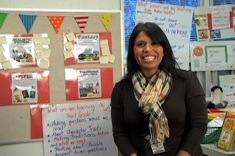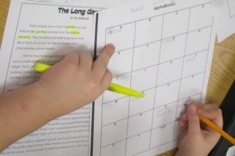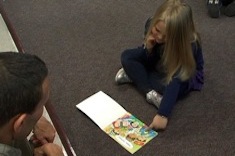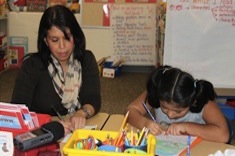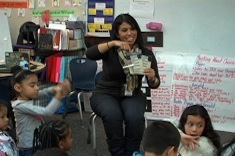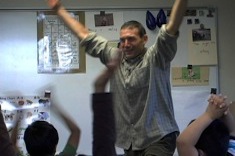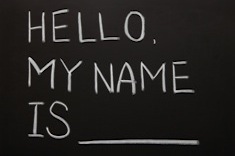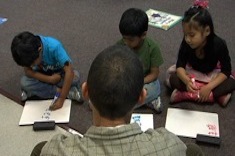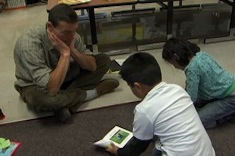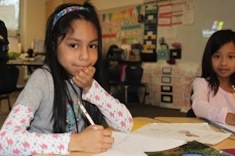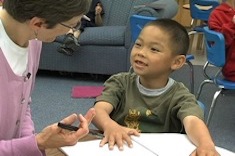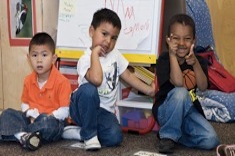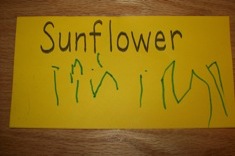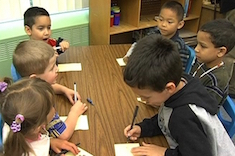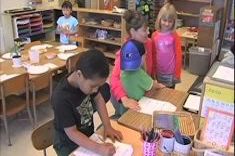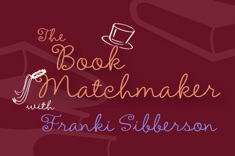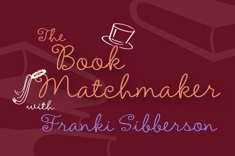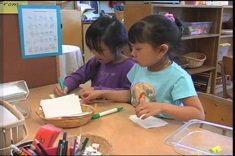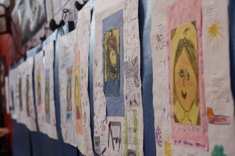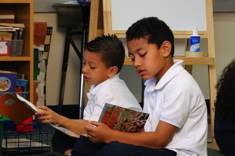English Language Learners
Whether you have one English language learner in your classroom, or hundreds in your school, there is little doubt meeting the needs of these students will be at the top of most schools' agendas for professional development for many years to come.
Latest Content
A Classroom for Elementary English Language Learners
Stella Villalba gives a tour of her classroom library and publishing corner designed to support the grades 1-5 English language learners she works with daily.
Phrasal Verbs and English Language Learners
Jennifer Schwanke writes about the need for teachers to understand how phrasal verbs work and why it is essential to teach them explicitly to English language learners.
Working with Emergent Bilingual Children (PODCAST)
In this podcast, Heather Rader chats with Ruth Shagoury about working with emergent bilingual chidren and their families.
Nonfiction and English Language Learners
Stella Villalba has advice about connecting nonfiction, young English language learners, and the Common Core.
Creating Your Own Kindergarten Assessment
Max Brand finds standard assessments don’t always give him the information he needs when working with kindergarten English language learners, so he develops his own tool for analyzing book handling skills.
Rehearsing Informational Writing: Conferring with Jocelyn
Stella Villalba confers with first grader Jocelyn about the information text she is writing about bunnies. Jocelyn is an English language learner, and this conference demonstrates the value of oral rehearsal for young ELL writers.
Do You Have Any Questions? Conferring with Families
We've all experienced that moment in a parent conference. You finish your spiel, which includes assessment data, charts, and an anecdote or two about the child. And when you're finished, the parent asks, "But how is my child doing?" Melissa Kolb explores the reasons why there can be a mismatch between our sense of useful information in parent conferences and a parent's expectations.
Every Picture Tells a Story
Max Brand describes how he uses images to build reading and writing skills among his kindergartners.
Weaving Word Study into Writing Workshop in 5th Grade
Maria Caplin describes how she integrates word study with intermediate students in writing workshops.
Integrating Vocabulary and Retelling Strategies into Read-Aloud
Stella Villalba scaffolds the language development of her first- and second-grade English language learners during read-aloud by highlighting vocabulary and providing a tool to assist with a partner retelling activity.
Linking Movement, Minds, and Literacy in Kindergarten
Max Brand explains how movement activities in classrooms with young learners can be so much more than a brain break or “getting the wiggles out”: movement can forge potent connections between mind, body, and story. The essay includes two video examples.
My Name Is Not Julie
Ellie Gilbert is deeply moved when her high school student connects to a text in a startling way. It’s one of those magic moments that keeps teachers coming back to classrooms, but is nearly impossible to share with others.
Using Wipe-Off Boards with Young English Language Learners
Max Brand describes why wipe-off boards are such a valuable tool for work with young English language learners in small groups. The article includes a video demonstration.
Guided Reading with Kindergarten English Language Learners
Max Brand takes two kindergarten English language learners from reading a familiar book to exploring a new text, and explains in the debrief how he targets specific reading skills.
I Have Two Pictures of Cindy. . .
Melissa Kolb writes about the importance of time and patience in meeting our goals with young learners — in this instance, a child who struggles to speak in her preschool classroom.
Hearing Carlos: Helping Young English Language Learners Develop Speaking and Listening Skills
Stella Villalba incorporates more speaking and listening activities into her primary classroom for English language learners.
Preschool: Learning in Many Languages
Melissa Kolb explains how she supports many languages in her preschool classroom through the thoughtful use of volunteers and other resources in this three-minute video.
Writer’s Launch
How do preschool teachers help their young students seem themselves as writers? Leslie Woodhouse explains how she works with students early in the year, and provides many samples of starting points for three- and four-year-olds.
Without Answers
English language learners may have some of the quietest voices in schools. In this poem and narrative, Stella Villalba shares the power of finding ways to bring those voices out in your classroom.
Are Your Writers Talking During Writing Workshop?
Stella Villalba shares practical tips for helping young English language learners collaborate with classmates and receive feedback during writing workshop.
Preschool Morning Sign-In
Melissa Kolb explains the social and academic value of morning sign-in for preschoolers.
Conferring with Vita: Working Through Silence
Andie Cunningham confers with Vita, an English language learner whose first language is Russian. Vita is in the silent period. Notice how Andie coaxes communication from Vita, and manages to convey a sense of delight at her work, an acknowledgment of Vita’s importance in the classroom community, and some guidance for future writing.
Book Matchmaker: Texts for Young English Language Learners
Franki Sibberson shares some of her favorite new titles for young English language learners.
The Power of Powerpoints for English Language Learners
Erin Ocon discovers a surprising tool to help her middle school English language learners develop their writing and oral language skills — Powerpoint presentations. Erin shares some practical tips for using presentation software to support English language learners.
Book Matchmaker: 5th Grade English Language Learners
Robin Heist is an elementary teacher looking for books for her older English language learners who are reading below grade-level expectations.
Preschool Thank-You Writing Center
Teachers Melissa Kolb and Andie Cunningham help preschoolers use the thank-you writing center in this quick two-minute video.
A Poetry Cafe Celebration
Stella Villalba explains how her poetry cafe program brings families together for a festive event, and helps English language learners develop reading and fluency skills at the same time. This is the first installment in a two-part series.
An ESL Poetry Cafe Celebration (Part II)
Stella Villalba explains how her Poetry Cafe program brings families together for a festive event, and helps English language learners develop reading and fluency skills at the same time. This is the second installment in a two-part series.
Raising Readers: Independent Reading, Choices, and Intentional Reading Practices
How can teachers promote good independent reading choices for English language learners? Stella Villalba has suggestions.
Classroom Gifts from Carlos: Helping Young Students Learn Academic Language and Routines
It can be especially difficult for young children from impoverished homes to understand academic language and the demands of school. Andie Cunningham observes the sophisticated ways a preschool teacher helps her students adapt with invitational language.
Browse Content By
Type
Category
- Assessment Tools
- Big Fresh Archives
- Booklists
- Choice Numeracy
- Classroom Design
- Common Core
- Community Building
- Conferring
- Content Literacy
- Digital Literacy
- English Language Learners
- Equity
- Family Relations
- Free Samples
- Guiding Groups
- Leadership
- Literacy Coaches
- Mentor Texts
- Minilessons
- New Teacher Mentors
- Podcasts
- Poetry
- Quote Collections
- Reading Strategies
- Self Care
- Struggling and Striving Learners
- Talking and Listening
- Teacher Study Groups
- Teaching Reading
- Teaching Writing
- Word Study and Vocabulary
Author
- Melissa Quimby
- Nawal Qarooni
- Gwen Blumberg
- Julie Cox
- The Lead Learners
- Hannah Tills
- Josie Stewart
- Ruth Metcalfe
- Mallory Messenger
- Becca Burk
- Jodie Bailey
- Vivian Chen
- Mary Brower
- Tiffany Abbott Fuller
- Stephanie Affinito
- Ruth Ayres
- Leigh Anne Eck
- Heather Fisher
- Shari Frost
- Julie Johnson
- Suzy Kaback
- Gigi McAllister
- Shirl McPhillips
- Melanie Meehan
- Cathy Mere
- Debbie Miller
- Tara Barnett and Kate Mills
- Tammy Mulligan
- Dana Murphy
- Bitsy Parks
- David Pittman
- Brenda Power
- Heather Rader
- Matt Renwick
- Mandy Robek
- Christy Rush-Levine
- Gretchen Schroeder
- Jen Schwanke
- Brian Sepe
- Katherine Sokolowski
- Stella Villalba
- Jennifer Vincent
Grade Level
Choice Literacy Membership
Articles
Get full access to all Choice Literacy article content
Videos
Get full access to all Choice Literacy video content
Courses
Access Choice Literacy course curriculum and training

